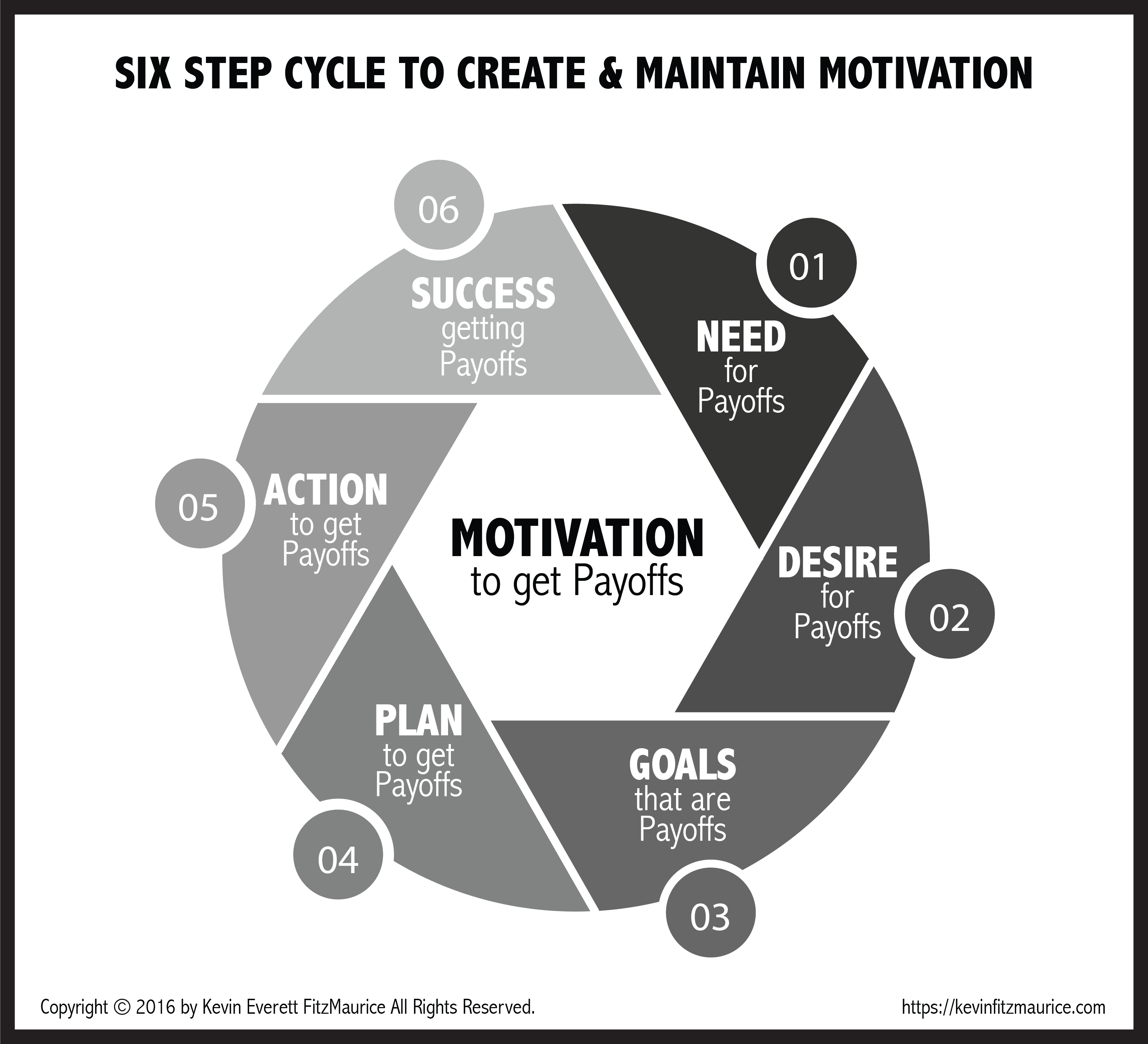Motivation6-Step CycleDiagramRelated Pages6 Groups of Topics10 Skills & Topics
Free New Diagram
for Attitude Is All You Need! Second Edition
- Breathe to learn Mind-Move to Quickly Regain Your Center
“If you want to live a happy life, tie it to a goal, not to people or things.” —Albert Einstein
“When it is obvious that the goals cannot be reached, don’t adjust the goals, adjust the action steps.” —Confucius
Note on Page
- This page contains a new diagram based upon the book Attitude Is All You Need! Second Edition
- It is meant to improve and update the motivation diagram in that book.
- Read for the best system to regain your attitude power.
6 Steps of Motivation Explained
Step 1: Need for Payoffs (Rewards)
- First, there has to be a need for a reward for motivation to begin.
- The diagram calls rewards “payoffs” because it was designed for psychological rewards, but the diagram also works with physical and spiritual rewards.
- If the feelings perceive there to be some imbalance (a lack of homeostasis), then a need for a return to balance is felt.
- The reward or payoff needed is homeostasis; for example, “I look fat and am not at my normal and healthy weight.”
- The balance will be regained when the person returns to their normal (proportionate) weight (not too thin or too fat, so a healthy balance).
Step 2: Desire for Payoffs (Rewards)
- The desire for a reward is different from a need for a reward.
- A need for a reward is often just a fact such as, “I need to lose weight to stay fit.”
- However, a desire for a reward provides emotional energy to pursue that reward, for example, “I want to lose weight, so I look fit.”
- Now there is a desire in the form of an intention to fulfill the reward, “I intend to lose enough weight to be fit again.”
Step 3: Goals that Are Payoffs
- The goals should be in line with their intentions.
- That is, the goals should be such that they will satisfy the intentions from the previous step. It is best if the goals are SMART goals.
- SMART goals are Specific, Measurable, Attainable, Relevant, and Time-limited.
- For more information on SMART goals, visit https://en.wikipedia.org/wiki/SMART_criteria.
- There you will find other terms for the SMART mnemonic/acronym that might better suit your needs.
- You can also use the suggestions to create a new list of words that better suits your goals and processes.
- Now there are concrete goals to be met that will fulfill the intention of the previous step, “I will lose 2–3 pounds a week until I have lost a total of 38 pounds.”
Step 4: Plan to Get Payoffs
- The intentions naturally follow from the goals of the previous step.
- Action steps are formulated to realize the goals of step three.
- If the action steps are followed without the required results, then the plans should be revised or discarded for better plans.
- Now there are concrete steps to take in order to meet the goals that will assure your final result (homeostasis).
- Some plans might include: walking to work instead of driving or walking part of the way; riding a bicycle around the neighborhood when you return from work; doing warmup and stretching exercises before you exercise; reducing sugar in your diet; eliminating white rice and bread from your diet by substituting brown rice and wholegrain bread (not processed brown bread because it is no better than processed white bread).
- The author’s favorite diet plan is, “Eat less and exercise more.”
Step 5: Action to Get Payoffs
- The actions (responses) to reach your rewards flow naturally from your plans.
- Here you do the work.
- Your Response and Feedback systems surround the work.
- Such intensity assures that the work is productive and malleable.
- Now you check off doing what you said you would do each day.
- When you slip off or fail to follow your plan, you go back a step or two and make better plans for your lifestyle and motivation levels.
Step 6: Success of Getting Payoffs
- This step gives you the experience you need to move forward and continue your journey of improving your health.
- This step is your “pat on the back.”
- The event-sensations circle is activated at this level for new experiences.
- You experience weight loss.
- You find that you have more energy from exercising, not less.
- Friends and family begin to notice your weight loss and compliment you on it.
- You can fit into some of your old clothes that you still like.
- Your positive experiences drive you to continue and even to experiment with doing more in a controlled and reasonable fashion.
- You add listening to audiobooks while walking to work to your practice routine.
- You consider attending a local yoga class during your lunch hour.
- You find and add chair exercises to your routine that you can do while working at your desk.
- You consider purchasing a desk that you can stand at when you work from home.
- Read for the best system to regain your attitude power.
6-Step Cycle of Motivation
- Click to go to the book this diagram is based on.
- Read for the best system to regain your attitude power.
Related Pages of Free Information
- 3 Ps of Motivation
- 12 Steps of Human Psychology
- Coping Skills: Free Help
- Homeostasis Is Explained in Stress for Success, 2nd Ed.
- Information on Attitude Is All You Need! Second Edition
- Motivating Questions
- Responsibility Issues: Free Help
- Stimulation as Motivation
- Thinking Skills: List Pages
- Will: The Basic Options for What to Will
- Read for the best system to regain your attitude power.
- Read and master the life skill of acceptance using the best combination of CBT, REBT, & Stoicism.
6 Groups of Topics Menu
- 1. Pages by Topic
- 2. Fast-Facts by Topic
- 3. Quotations by Topic
- 4. Poems by Topic
- 5. Scripture by Topic
- 6. Websites by Topic
- Read and discover how CBT, REBT, & Stoicism evolved into one system: STPHFR.
- Read for the best breathing exercises for your feelings and stress.
- Read for the best system to regain your attitude power.
9 Skills & Topics Menu
- 1. Anger Skills & Topics
- 2. Blame Skills & Topics
- 3. Communication Skills & Topics
- 4. Coping Skills & Topics
- 5. Counseling Skills & Topics
- 6. Praying Skills & Topics
- 7. Recovery Skills & Topics
- 8. Responsibility Skills & Topics
- 9. Thinking Skills & Topics
- Read and discover how CBT, REBT, & Stoicism evolved into one system: STPHFR.
- Read for the best breathing exercises for your feelings and stress.
- Read for the best system to regain your attitude power.




